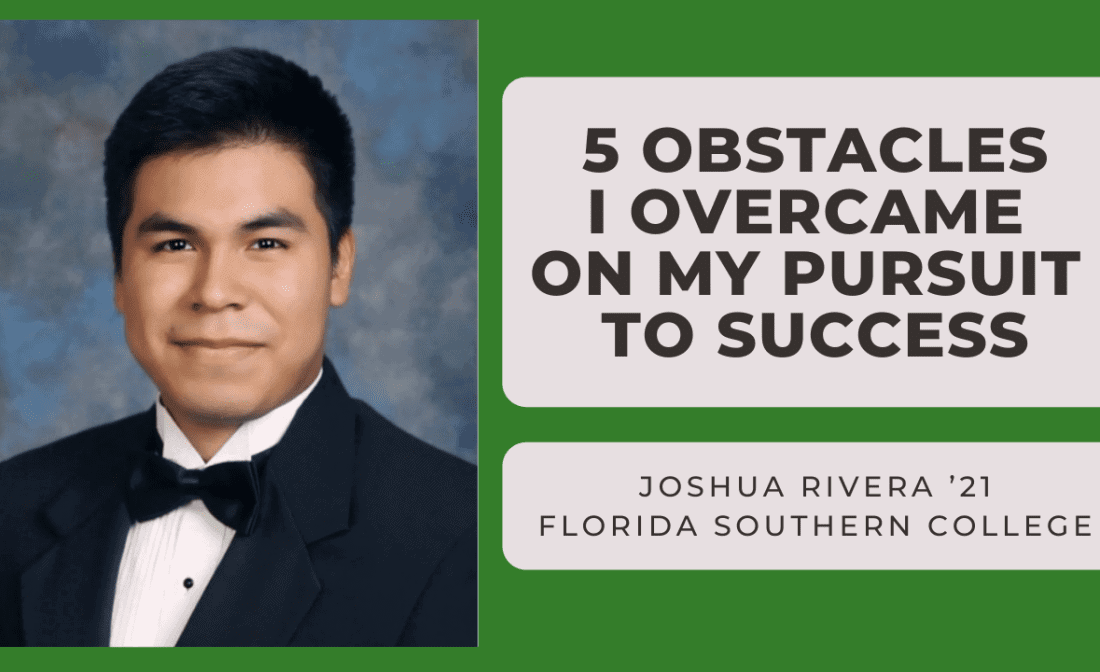5 Obstacles I Overcame on My Pursuit to Success
As I enter the final chapter in the story of my undergrad experience, I have come to find myself reflecting more regularly on my journey to my degrees. As a child I was told to seek success, and though I was regularly told I could accomplish this goal, I was never told what to search for or how to accomplish said task. Success, though desired by so many, is so rarely given any definite dimensions, and for good reason. Success looks very different for each individual—personally, coming from a low-income background, I had always understood success to mean getting into a profession that would allow my family to leave the dangerous neighborhood we called home. In my schooling career, I had several adults who saw my potential and who tried to help direct me towards a path that would allow me to accomplish this goal, but there was never really an individual willing to guide me through the complicated process of applications or teach me how to seek out opportunities not advertised. I now find myself at a wonderful college, Florida Southern, where I have been given an unbelievable opportunity to study and follow my dreams with little financial worry.
Though we all have our unique struggles, here are five examples of the greatest struggles that I can proudly say I have overcome!
Poverty
I have done everything within my power to make sure a price tag would never keep me from enjoying an experience, but to say my impoverished background has not been a struggle would be misleading. I was raised by my mother alongside my older brother and sister in a run-down neighborhood best recognized for its crime rate and low expectations of its residents. The greatest impact that this has had on my experience has been the lack of available resources as a result of a lack of financial resources.
Though I come from a poor background and a bad neighborhood, I was fortunate enough to attend an IB elementary school where I excelled in spite of my limited resources, and eventually went to a high school that regularly placed in the top 50 high schools in the country. While the opportunities afforded to me as a result of my attendance at these schools was greater than that given to individuals at less-funded schools, it was no walk in the park. My brother Peter and I used to talk about the amount of work demanded of us to have a foot at the same starting line as everybody else in our efforts to catch the eye of top colleges. Students regularly attended programs in after-school hours, paid upwards of $100 an hour for the top tutors who guaranteed several points in improvement on standardized exams, and who could fill pages upon pages speaking about incredible experiences or lessons learned in unbelievable internships.
Whereas I was surrounded by students with great connections and financial backing to provide them resumes that would ensure their attendance to the top twenty colleges, my siblings and I regularly worked full-time jobs and were restrained to school hours to get our work done. Once we realized this, instead of sulking or feeling sorry for ourselves, we agreed that whereas most people work twice as hard to get ahead of the pack, we had to work twice as hard simply to get to the starting line. This realization helped us understand that we were truly at a disadvantage, but to use the resources we did have to our advantage. A positive attitude alone, however, will not help you overcome such an immense struggle. It was a great help to have my brother and sister there to support and encourage me, but the real counter to poverty was our unbelievable work ethic that developed out of necessity.
Because we had to work so much in addition to school, we only had about half the potential time that most students had to get work done. Assignments meant to take a week now had to get done in five days or less. Reading that should take three hours had to be done in one. Résumés, extracurricular work, applications, and the like had to be done within the six hours we had available at school.
An incredible work ethic was my greatest asset in overcoming the seemingly insurmountable obstacle that is poverty. Further bolstered by a positive attitude, as well as a realistic perspective on my position in life, I was able to maintain a high level of motivation that allowed my work to be done efficiently and with high quality. My greatest piece of advice is to remember why you do what you do and to share that reason with very few people, if any at all. The last piece is very important, as it teaches you to understand who is truly a friend and who is a friend for the moment. Not everybody will understand your dreams, and that’s fine. So choose the people you confide in wisely, and those people will help push you beyond the limits that poverty places upon any individual.
Language Barrier
My first language is Spanish, and it was not until I began schooling at the age of five did I feel the impact of not knowing English in a predominantly English-speaking country. Beginning school is a struggle in and of itself as you grow accustomed to the new schedule, faces, and places, but not being able to even ask to use the restroom made things even more difficult. My mother first taught me how to speak in Spanish, as it was her native language and we didn’t have much need for English within the household or neighborhood. Though I now am quite grateful for this skill, speaking Spanish was seen as a hindrance by my instructors.
I entered kindergarten with little expected of me, as I consistently received the lowest marks on all my assignments. For a time, I was ignorant to the fact that I was not doing well because the school failed to communicate with me or my mother about my grades. That is, until the first semester ended and I was in danger of being held back. Once facing this realization, in conjunction with having been bullied for my inability to speak English, I quickly realized I had to make a conscious effort to learn the language.
Learning English, however, was a task much easier said than done. There are several irregular rules that don’t exactly translate to other languages as English is an amalgamation of several language’s rules. Nonetheless, I was dedicated to overcoming this challenge and proving my worth as a student. The task was made more difficult, though, by having nobody close to me to guide me in my lessons, and my school had seriously neglected any opportunity to give me a language teacher.
My advice for overcoming such a barrier is to discover your personalized method of learning. In my experience, I had nobody to lean on and no formal structure or institution for learning the language—I was left with only my determination and critical thinking skills. Following some lessons that I could still not understand, I realized I could quickly observe objects or individuals or patterns and make certain predictions behind meanings of sounds. I used this as a base for establishing certain sounds that were regularly used in English. Quickly, however, I realized I wasn’t able to actually retain any of this knowledge unless I myself attempted to form the words. After making this connection, I realized my learning style was very physical—my ability to comprehend a subject was accelerated by my opportunity to feel or physically accomplish a task.
Once I realized my learning style, I began to observe sounds and the corresponding shape of the mouth created by the one who elicited the sound. After I had a basic understanding of how to form sounds the only task remaining was a simple one of associating these sounds with objects which was a far easier task to accomplish. Examples were when we needed to “line up” for lunch I could associate the words with the shape the students began to form, or when asked to close the door I followed the path created by the teacher’s finger.
Overcoming a language barrier is a tall task to say the least, but it is most certainly not an impossible one. My advice to those who find themselves in a similar position is to find the means of learning that work best for your mind. Not everybody will be able to look at a book and digest the rules of a language, so know that you can find the style of learning that will be best processed by your mind. Most importantly, don’t let your frustration overcome your dedication to learn the language. Whether or not you need to learn the language for a reason like my own, or if you’re choosing to learn it for the sake of learning it, find your way of learning and enjoy the process!
Bullying
Though I am beyond proud of being bilingual and able to relate to my Mexican roots, it sadly caused considerable trouble as I began school. Alongside the challenge of learning English to keep up in the classroom, my poor performance made me vulnerable to bullying by my peers.
I was an active child who loved to learn about the world around me, and so I was ecstatic at the opportunity to go to school. Much to my dismay, I was unable to learn anything for the first semester I attended. My poor performance was the last thing on my mind, however, as I was constantly left to myself in class and struggled a great deal to make any sort of connections. Being so young, I hadn’t realized that this was abnormal and that the remarks made by my classmates were in fact directed attacks.
I had not realized the full extent of this problem until a fateful day at recess. The school had a large jungle gym fully equipped with a slide and monkey bars—the works. Unfortunately, I didn’t have many friends and so I spent most of my time sitting on the swings by myself. One day, a few of my classmates had approached me and insisted I follow them, saying something I couldn’t understand. Once we climbed the jungle gym I truly felt on top of the world as it seemed I would have friends for the first time in the semester. Unfortunately, I had been misled and they had planned what they thought would be a harmless prank.
The students lured me to the edge of the jungle gym where the monkey bars began and pushed me off the edge. I don’t remember much beyond the push and the proceeding fall, but thankfully I turned out alright! I had to face a number of instances of bullying following this, thankfully none quite as physical as this. This constant harassment had been one of my biggest driving forces to learn English so that, if I couldn’t be their friend, I could at least tell them to stop in a language they would understand.
Bullying and harassment is a difficult challenge to overcome, and there is no easy remedy nor a one-size-fits-all method. To those who can relate with this struggle, I urge you to remember that the perception of others is never the truest form of who you are. In attempting to resolve the issue never be afraid to stand up for yourself and seek the help that is necessary—in hindsight I should have gone to an adult and asked for help. Even later on in my years I experienced harassment for being Mexican chose not to do anything about it. Though a daunting task, never allow the negative words or actions of others to deter you from finding the help you need or from aspiring to achieve your goals.
First-Generation College Student
Being a first-generation student is one of my greatest points of pride and has been an opportunity that I have taken very seriously. However, with being the first comes a number of obstacles I had to navigate on my own. These issues largely fall under two main problems I learned to overcome: breaking a stereotype and navigating the college application process.
For quite some time it was believed the human was unable to run a 4-minute mile because it had never been done. Likewise, the idea of reaching the moon was seen as an impossibility, as well as a number of other astounding accomplishments we now know we are quite capable of accomplishing. My point being this: when X has yet to be accomplished, it’s a challenge to find yourself believing that it can be done at all. Being a first-gen student left me questioning my capabilities more times than I’d care to admit. Surrounded by students with help coming from every member of their family who already held a degree, I felt inadequate. These same students interning with esteemed law firms, traveling to study abroad a summer, and having tutors to ensure their 4.0 GPA were going to be my competition in the application process—a process I had no idea how to navigate with assistance only from a counselor who was split between a class of several hundred students. Needless to say, I had to do a considerable amount of research and self-study to prepare.
It’s difficult to say what exactly helped me break the negative mindset that I could not do what had yet to be done. In reality, it was a combination of things; largely, it depends on your commitment to accomplish something great. I witnessed a number of students in similar positions as myself succumb to the idea of being adequate and their performance reflected their mindset. Though I question whether what I had in mind for my goals was realistically attainable, I never question the idea that I was meant to be great. Not to say I never doubted my abilities or the path I was on; rather, I knew I was going to be more than the conditions I was born into and the only person who could make me less than what I was meant to be was myself.
So, as cliché as it may be, truly believing in yourself and truly believing in your ability to accomplish something great will drive you further than any tutor or dollar amount on a check.
It was this belief that kept me driven to understand the process that is incredibly difficult to navigate on your own. I would be lying to say I did not receive any help; I was fortunate enough to have earned a scholarship through a program called Take Stock in Children where I was paired with two mentors. These mentors, Matt and John, were amazing motivators to continue in my studies and pursuit of a legal career as well as major assets in understanding college applications.
The college application is a beast unlike any other, and is a challenge to understand without the proper support team. My advice on overcoming this challenge is to remember it’s just an application—regardless of what it could mean to your future, it is just another application and your opportunity to describe yourself beyond the classroom. For those struggling more and who find themselves without any help, don’t be afraid to keep asking. Somebody will recognize your drive and you will get the help you need. You just can’t be afraid to keep speaking up for yourself.
Expectations From Others
Lastly, the greatest challenge I have overcome has most certainly been ridding myself of the expectations placed on my future by others. Quite honestly, I am unsure if there is anybody who hasn’t faced this problem themselves—some may have without realizing whether they are living to conform to others’ expectations. Nonetheless, I found myself for the longest time with two sets of goals: one set were mine and aimed at bettering my life and the life of my family, and the other was to please the people who lent a helping hand on my way through school and up to where I am now.
While I am extremely grateful for all the help I’ve received throughout the years from everybody, it took me some time to understand that my entering college was for me, not for anybody else. Likewise, my going to law school and becoming an attorney is so that I can do what makes me happy and help people in a way I know I would enjoy. While this would make a number of people in my family happy, there is a stark difference between doing something for yourself and doing something for the sake of appeasing others. A difference that is critical for everybody to understand!
My method for overcoming this was simply to sit down with myself and plan out my next week, month, year, and so on to make sure the plans I was making were for myself. I began to notice I was readily scheduling things in the short term that others wanted me to participate in and sacrificing time for my personal interests. So, I found myself having a real conversation with myself as to whether or not most of my schedule was going to benefit my pursuit of a degree or was going to be for the sake of making others happy.
This can be easily confused with taking too much time for yourself or giving yourself over to others excessively—it’s important to find a happy middle ground. Personally I find myself abiding by an 80:20 rule where I spend 80% of my time doing what is going to benefit my career and the other 20% splitting my time between myself and my friends. This is a challenge that can be easily resolved once identified but difficult in coming to accept that it is occurring at all. I truly felt that I was spending hours upon hours going to different events for my sake until I realized I was shirking responsibilities and the quality of work was diminishing. My advice is simple: take time for yourself and make time to seriously consider your use of the next 24 hours. I also highly recommend using a planner to get a better view of what you’re prioritizing and where you may be forgetting to add focus.
Being successful is difficult, but not impossible. I am now a senior at Florida Southern College looking ahead at a number of opportunities to attend law school and can reflect on a younger, more unsure version of myself struggling to avoid the crime and drugs that infested my neighborhood. If anybody can relate to my struggles, I wish you all the best and hope my advice can at least help you take the first step to realizing your potential!




